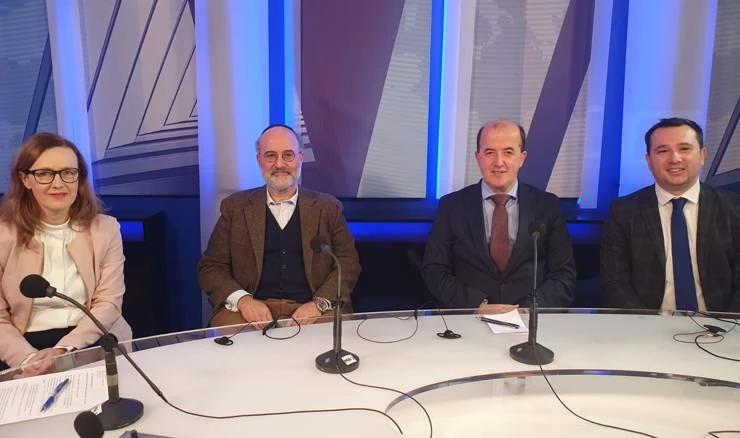On Monday 16th of January 2023, the head of our research group, Anto Čartolovni, spoke about the ethics of artificial intelligence on the Croatian Radio and Television program “Meeting in Dialog”. The program’s editor is Blaženka Jančić, and speaking alongside were Deputy Mufti Mevludi Arslani of the Mosque of the Islamic Community in the Republic of Croatia and Rabbi of the Jewish Community Bet Izrael Kotel Dadon.
Anto Čartolovni presented the goal of the Rome Call for AI Ethics, which is based on the three main goals of ethics, education, and law, on which the entire development of artificial intelligence can be based. He highlighted six principles that are innovative in the field of ethics and moral theology and related to the field of artificial intelligence. In this context, he emphasized transparency, inclusivity, responsibility, impartiality, protection of the privacy of each individual, and security. Čartolovni said that security is one of the biggest challenges in the development itself, i.e., it is important that the algorithms can be relied upon to be accurate and to perform their main function in the best possible way. The Catholic University of Croatia is the only institution in Croatia that has joined the Rome Call for AI Ethics. It did so on October 27, 2022, thanks to the Rector of the Catholic University of Croatia, Željko Tanjić, who recognized the value of this initiative and the potential of its implementation in Croatian society, especially in the education system. In the vision and further development strategy of the Catholic University of Croatia and in the field of IT, it is their wish that the development and the educational program start with a certain humanistic education, i.e. that ethics should already be present in the educational system in order to shape future engineers to find solutions that are acceptable for the whole society
Čartolovni said that security is one of the biggest challenges in the development itself, that is, it is important to be reliable that a person can rely on algorithms, that they are accurate, and that they perform their main function in the best possible way. The Catholic University of Croatia is the only institution in Croatia that joined the Rome Call for AI Ethics. They did it on October 27, 2022, thanks to the rector of the Catholic University of Croatia, Željko Tanjić recognized the value of this initiative and the potential of its implementation in Croatian society, especially in the education system. With the vision and further development strategy of the Catholic University of Croatia and in the IT sector, it is their wish that the development and the educational program begin with a certain humanistic education, i.e. that ethics should already be in the educational system in order to form future engineers to find solutions that are acceptable for the entire society and that the development of algorithmic solutions should be acceptable to all, emphasized Anto Čartolovni.
Rabbi Kotel Dadon explained that Jewish teachings consider man as a co-creator. He said that God created the world but did not complete it, but that man is his co-worker in creation and has the task of responsibly continuing the work of creation. He believes that this is a blessing and that development should be supported, and that each country should organize the field so that there is no abuse. Artificial intelligence can be a blessing and a help to humanity, but if this development is considered only from the point of view of profit, it can also have undesirable consequences. Rabbi Dadon said that we should not be afraid of change and that we should learn from history and see what happens when the development of science is hindered. Therefore, he stressed the importance of supporting the development of science and artificial intelligence for the benefit of all humanity. Dadon said that Judaism supports science because it helps and benefits mankind.
The deputy mufti Mevludi Arslani of the Mosque of the Islamic Community in the Republic of Croatia said that Muslims support the development of artificial intelligence, that Islam requires its members to be useful to society also in research and progress in this field. However, he said that Islam sets the condition that the development related to artificial intelligence should be in the service of the individual, the community, i.e. the human race, and in no way to its detriment. He said that there are also harms and abuses. He pointed out that for religions, profit comes last and the general benefit for the individual and society comes first. Arslani believes that an ethical code of conduct should be adopted at the global level to prevent discrimination and regulate the field of artificial intelligence. He emphasized that the positive effects of artificial intelligence are far greater than the negative ones.
An audio recording of the conversation can be accessed at this link.
The text is translated from the website of Croatian Radio and Television.




